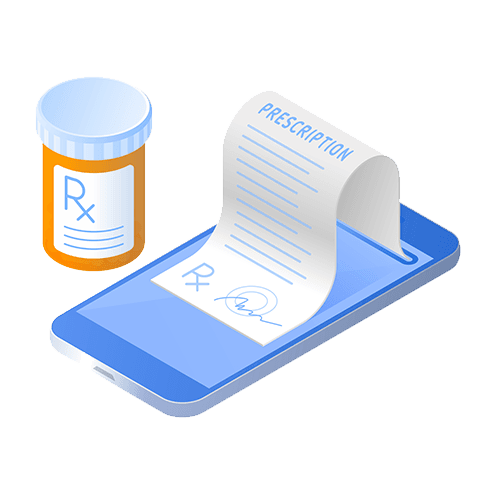How Can We Help You Today?
What is birth control?
In Australia, access to effective and reliable contraception plays a vital role in empowering women to make informed decisions about their bodies, relationships, and future. With a wide range of contraceptive options available, it’s essential for women to have a comprehensive understanding of the choices at their disposal.
Talk to a Medmate doctor today about your options.

How does the oral contraceptive pill work?

The combined pill has two female hormones and stops the ovaries releasing an egg each month.
For discretion and convenience, you can talk to an online doctor with Medmate, at a time that best suits you.

Get birth control online

Simply fill out an express consultation request. Our clinicians will review your information, discuss a personalised treatment plan, and issue a digital script within minutes. With Medmate, you can skip the hassle of traditional clinics and get fast, discreet birth control from the comfort of your home.

What are types of oral contraceptive pill?

There are two main oral contraceptive pills that can be used regularly in order to prevent pregnancy in advance of sex. These are the combined pill and the mini-pill.
All the clinicians we work with are 100% independent and will talk to you about the options.

Is it confidential to consult an online doctor about my problem?

Yes. Online doctor consultations adhere to stringent privacy guidelines and ensure confidentiality. Medmate online doctors are registered medical practitioners in Australia, and your personal information and medical records are safeguarded under Australian privacy regulations.
Frequently Asked Questions
What is the Contraceptive Pill and How does it Work?
There are two main types of oral contraceptive pills (OCP) used to prevent pregnancy: the combined pill and the mini-pill.
The combined pill contains two female hormones and prevents the ovaries from releasing an egg each month. It must be taken daily at roughly the same time each day. If a dose is missed, it should be taken as soon as remembered, followed by the next dose at the usual time. When used correctly, this pill is 99.7% effective at preventing pregnancy.
How Long Until the Contraceptive Pill Works?
You must take 7 combined hormone pills daily for 7 days in a row before this pill will be effective in preventing pregnancy. During those first 7 days an additional form of contraception ie condoms should be used to prevent pregnancy.
When first starting the mini-pill, addition contraception ie condoms should be used for the first 48 hours.
What are the Risks of the Contraceptive Pill?
Although it is not common to have serious health problems as a result of taking the oral contraceptive pill it is not recommended in women who suffer from focal migraines, who have a history of blot clots, women with liver disease and women with unusual vaginal bleeding.
Common side effects of the OCP include tender breasts, nausea, spotting in between periods. It may also cause some weight gain, changes in mood and libido for some women.
It’s important to talk to the doctor about risks and side effects to make an informed choice.
How does the morning after pill work?
The “morning after pill” is a form of oral emergency contraception used after sex to prevent pregnancy if you had sex without using contraceptive protection or when the chosen contraceptive method fails ie broken condom or missed contraceptive pills. In Australia there are two “morning after pills’ called Levonorgestrel (LNG) and Ulipristal Acetate (UPA). These pills work to prevent pregnancy by stopping the ovaries from releasing an egg. Although these have been called the “morning after pill” in reality they can be used anytime of the day for up to 5 days after unprotected sex.
How effective is the morning after pill?
Of the two available emergency oral contraceptives, UPA is more effective at prevent pregnancy that LNG. If taken within 5 days of unprotected sex, UPA prevents pregnancy in all but 1.4% of women and LGN prevents pregnancy in all but 2.2% of women. Taking an emergency contraceptive as early as possible, ideally within 24 hours, after unprotected sex increases the effectiveness of the pill.
Does birth control protect me against STIs?
Condoms are the only contraceptive that provides protection against STIs but it is still possible for viruses, such as herpes simplex virus, to be active or shedding in places not covered by the condom causing transmission in areas of skin to skin contact.
Protecting yourself against sexually transmitted infections (STIs) is a multi-pronged approach. It involves activities like being educated about sexual health, being vaccinated against HPV, having regular cervical and STI screening with your general practitioner (GP) if you are sexually active to allow early detection and treatment. And importantly having open and honest discussions with your sexual partner or partners about each persons sexual history.

